
Review
The Batman is a triumph – a masterpiece!
by Luca Fontana

Taika Waititi is a screenwriter, director and recently also Adolf Hitler. Sound like a very bad idea? It actually resulted in one of this year’s most touching movies.
First off, let me be clear: there are no spoilers in this review. I’m not going to talk about anything that isn’t mentioned in the trailers.
The year is 1945. The Allies are ready to march across the German borders. Jojo Betzler (Roman Griffin) is a ten-year-old, under the spell of German fascism. When he’s looking to join the Hitler Youth, he messes up the initiation rite so bad, that he’s given the ignoble nickname «Frightened Rabbit». And there you have it: Jojo Rabbit.
Luckily, he has an imaginary friend by his side, to offer advice and support along the way: Adolf Hitler (Taika Waititi). And he explains to him: the greatest threat does not come from outsiders, but rather from the enemy within – by Jews. Horned, scaly and mind-reading monsters, who are attracted by all that glitters and eat young, blonde Aryans such as Jojo.
In the same vein, Jojo’s world view is turned upside down when he discovers that his single mother (Scarlett Johansson), who is a well-respected member of the Party, is actually hiding a Jewish girl (Thomasin McKenzie) in her attic. Go figure!
There are almost no directors who manage to strike a balance between humour and severity as well as Taika Waititi. That's nothing new. He also wrote the movie’s script. The scope of his ambitions is, however, new: never before has Waititi tackled an issue as sensitive as this one: we’re talking about Nazi Germany, which nurtures antisemitism and prejudice. Those who resist are eradicated like weeds. Once and for all. To make jokes about this seems inconsiderate and, quite frankly, insane.
But Waititi is insane.
Nothing is sacred to him. Especially not his own persona. He plays Adolf Hitler with gusto, sporting the typical haircut and moustache – not the real one, of course, but rather an overdone, fantasy version of the Führer. A Hitler which can only sprout from the mind of a ten-year-old, who needed three weeks before he could accept that his grandfather wasn’t blonde. Such as when Adolf Hitler gleefully feasts on the roast head of a unicorn, while Jojo has to make do with a thin soup of water with a subtle hint of potato.
Sure: Waititi risks overdoing it a bit with his Hitler parody, venturing into the realm of bad taste at times. However, his Hitler persona is responsible for some of the film’s funniest moments. For example when Jojo discovers the Jewish girl in the attic and thinks of ways to get rid of her without his mother noticing.
«How are you getting on with our little problem up there,» asks Hitler.
When Jojo is fazed by the question and asks for advice, Hitler snidely responds: «No idea. It’s not like I’m the expert.»
Don't worry: Waititi is well aware, that Hitler jokes go stale quick. He mainly uses this trick in the first third of the movie, but doesn’t rely on it too much. To be honest, he really doesn’t need it to illustrate just how donkey-brained the Nazi regime is.
«Germany is one of the most advanced civilisations in human history,» says Miss Rahm (Rebel Wilson), head of the Hitler Youth. «Now, let us burn a few books!»
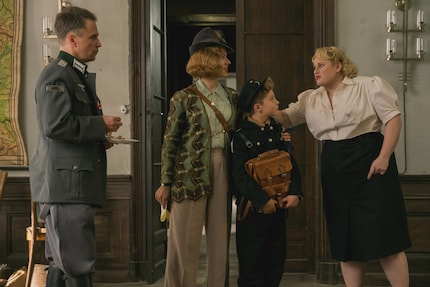
Through it all, Waititi is clever enough to refrain from resorting to laugh-out-loud comedy. It would be inappropriate, considering the matter at hand. His comedy here is much more the observational kind, which shows that the New Zealander has studied the subject quite thoroughly. And no, «Jojo Rabbit» is nowhere near as cheesy or superficial as the trailers might lead you to believe.
Every time you fear that the film might drift into slapstick, those emotional moments, which are so typical of Waititi, simply hit the bull’s eye. In one scene, Jojo is convinced that his missing father is a war hero of the Third Reich. The vague suggestions and looks of his mother, however, inform us, the audience, that the truth might be a little more complicated. For example, when they are both walking through town and suddenly see lifeless bodies hanging from a noose – dissidents, who helped Jews.
«What have they done,» Jojo asks his mother.
«What they could,» she quietly responds.
Waititi does not shy away from using imagery which is both subtle and brutal at the same time .
The visual style of Taika Waititi is often reminiscent of director Wes Anderson: most scenes have a meticulously arranged symmetry with little depth – like flipping through a book of fairytales. This is joined by Andersonesque warm, orange-blue hues. Stylistic devices which aptly send us, the viewers, 75 years back in time.
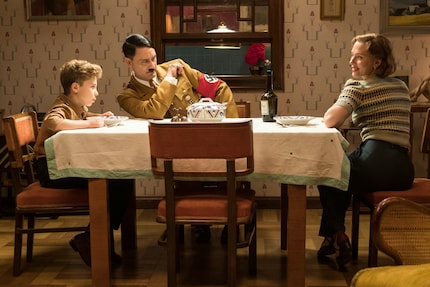
«Jojo Rabbit» also works so well because Waititi managed to assemble a highly talented cast of actors. Roman Griffin plays the young Nazi in such a manner that he’s never unlikeable. Scarlett Johansson plays Jojo’s mother as a veritable beacon of hope: she never loses faith that her misled son will someday find his way back to reason. She gives the film some much-needed warmth and truly deserves the Oscar nomination for best supporting actress.
She’s joined by a stellar Sam Rockwell, who obviously enjoyed himself playing the disenchanted, permanently drunk wannabe-warrior Captain Klenzendorf, teaching the Hitler Youth how to fight under water and seeking to explain to the girls just how important it is to bring children into the world. He’s supported by Alfie Allen, also known as Theon Greyjoy in «Game of Thrones» who plays a sort of goofy cadet.
Young Archie Yates is a true show-stopper as well, shining in the funniest scenes as Jojo’s best non-imaginary friend Yorki. Maybe that’s because he and Jojo try to make sense of a world torn apart by hate.
«It’s definitively not a good time to be a Nazi,» young Yorki stammers with such innocence that it almost hurts.
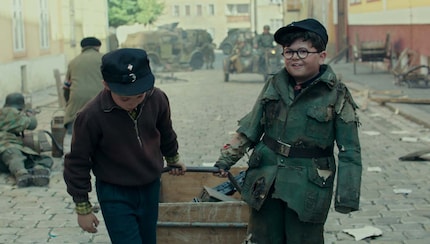
I was, however, most taken by the acting of Thomasin McKenzie, who plays the Jewish girl Elsa. Also because she doesn’t really appear in the trailers, and I had no idea what her character would add to the story. Therefore, I can’t spill too many beans here without giving away anything.
The only thing I'll say is: it’s both funny and heart-breaking to see how she first plays to Jojo’s preconceptions of Jews to have a bit of fun with him. At the same time, the viewers start to understand just how incredibly brainwashed kids must have been growing up in Nazi Germany during the Second World War.
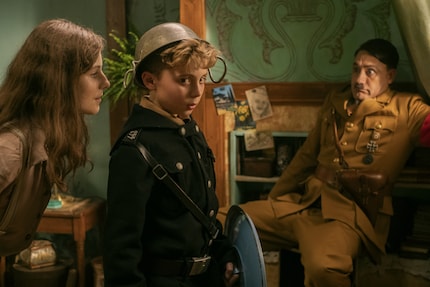
In the end, I’m hardly surprised that Waititi’s latest film has also been nominated for an Oscar [in the «Best Film» category.] (https://oscar.go.com/news/nominations/oscar-nominations-2020-list-nominees-by-category) In my view, «Jojo Rabbit» is fundamentally a story about overcoming false prejudices and apparent differences – told against the backdrop of fascist Germany during the Second World War.
Or: a touching story about tolerance.
Director, screenwriter and actor Taika Waititi plays Adolf Hitler in a satirical comedy about Nazi Germany. A true tightrope walk. I can already hear the moralisers whisper: «You shouldn’t do this.»
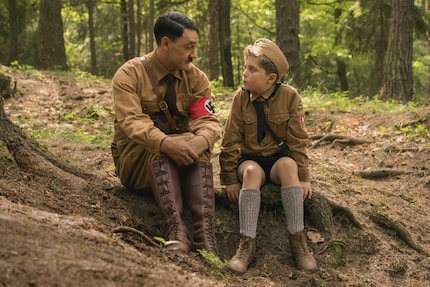
But I think: yes, you should. Because the language of satire revolves around conscious exaggeration, blowing up the truth to make it more recognisable. Add to this Waititi’s penchant to create momentary clashes between controversial comedy and unexpected, emotional passages. A mix which the New Zealander already introduced to audiences with «Hunt for the Wilderpeople» and «What We Do in the Shadows» – and to a lesser extent also in «Thor: Ragnarok».
And even if we were to say that Taika Waititi’s «Jojo Rabbit» isn’t a satire, then we’re left with a tale of tolerance within a regime which couldn’t care less about it. A story which is worth telling and is not only funny – actually funny –, but also deadly serious.
Taika Waititi at his finest.
«Jojo Rabbit» was released in cinemas in Germany and German-speaking Switzerland on 23 January 2020. The film hit movie theatres in French-speaking Western Switzerland on 29 January; in Ticino, it’s been in the theatres since 16 January 2020.
I write about technology as if it were cinema, and about films as if they were real life. Between bits and blockbusters, I’m after stories that move people, not just generate clicks. And yes – sometimes I listen to film scores louder than I probably should.
Which films, shows, books, games or board games are genuinely great? Recommendations from our personal experience.
Show all